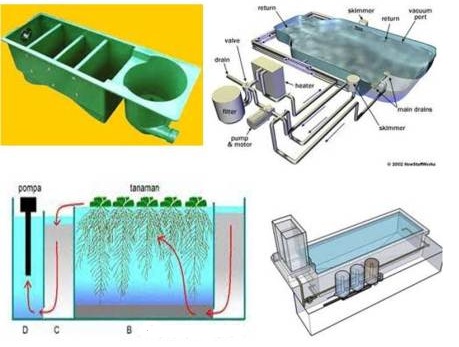
The Ultimate Guide to Gravity Filters for Koi Ponds
Introduction
A gravity filter is a crucial component in any koi pond filtration system. It removes debris, harmful chemicals, and bacteria to keep the pond water clean and healthy for the fish. In this article, we will explore the different types of gravity filters, how they work, and why they are essential for maintaining a healthy koi pond.
What is a Gravity Filter?
A gravity filter is a type of biological filter that uses gravity to circulate water through a series of media filters, which physically remove debris and biologically convert pollutants. Water flows from the pond into a pump chamber, where it is then pumped up into the gravity filter. The pumped water passes through a series of filter media, which promotes the growth of beneficial bacteria that break down and convert pollutants into less harmful compounds. The filtered water then falls back into the pond, aided by gravity.

The Benefits of a Gravity Filter
- Improved Water Quality: The primary benefit of a gravity filter is that it improves the overall water quality in your koi pond. The filter removes harmful chemicals and bacteria, which can cause a variety of health problems for your fish.
- Ease of Maintenance: Gravity filters are easy to maintain and can be cleaned quickly with minimal effort.
- Cost-Effective: Gravity filters are cost-effective, making them a popular choice for many pond owners.
- Long-Lasting: With proper maintenance, a gravity filter can last for several years.
Types of Gravity Filters
Upflow Filters
Upflow filters work by forcing water to flow upwards through the media filters. The water then drops back down into the pond by gravity. Upflow filters are excellent for removing solid debris and larger particles from the water. They also provide a lot of oxygen to the beneficial bacteria living in the media filters, which improves their efficiency.
Downflow Filters
Downflow filters work by pumping the water from the pond to the top of the filter, allowing it to flow down through the media filters. The water then flows back into the pond by gravity. Downflow filters are great at removing smaller particles and pollutants from the water, making them ideal for koi ponds with a high bio-load. They can also be more efficient than upflow filters because the water spends more time in contact with the beneficial bacteria.

Horizontal Filters
Horizontal filters work by pumping the water from the pond into the side of the filter. The water then flows horizontally through the media filters, before exiting the other side of the filter and flowing back into the pond. Horizontal filters are less common than upflow and downflow filters, but they can be useful for larger koi ponds.
Factors to Consider When Choosing a Gravity Filter
- Pond Size: The size of the pond will play a significant role in determining what type of gravity filter you need. Larger ponds will require more powerful filters to maintain optimal water quality.
- Flow Rate: The flow rate of the pump will also be a determining factor. A pump that is too powerful for the filter can cause the filter media to clog, while a pump that is too weak will not provide adequate water circulation.
- Maintenance: Consider the maintenance requirements of different filters before making a selection. Filters that require more frequent cleaning will likely be more time-consuming and labor-intensive.
Maintaining Your Gravity Filter
Maintaining your gravity filter is essential to ensure it continues to work efficiently. Here are some tips for maintaining your gravity filter:
- Clean the filter media at least once a month.
- Remove excess algae from the pond to prevent it from clogging the filter media.
- Monitor the water flow rate to ensure it remains within the recommended range.
- Inspect the pump and filter regularly for signs of wear or damage.
- Replace any worn or damaged parts promptly to maintain the filter’s efficiency.
Conclusion
A gravity filter is an essential component in any koi pond filtration system. It improves the overall water quality, making it healthier for your fish to live in. There are several types of gravity filters to choose from, each with their own benefits and application. When choosing a filter, be sure to consider the size of your pond, flow rate, and maintenance requirements. With proper maintenance and upkeep, your gravity filter will provide many years of outstanding performance.